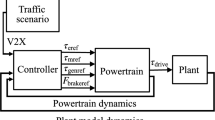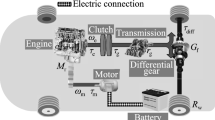Abstract
This paper proposes an energy management strategy for the benchmark problem of E-COSM 2021 to improve the energy efficiency of hybrid electric vehicles (HEVs) on a road with a slope. We assume that HEVs are in a connected environment with real-time vehicle-to-everything information, including geographic information, vehicle-to-infrastructure information and vehicle-to-vehicle information. The benchmark problem to be solved is based on HEV powertrain control using traffic information to achieve fuel economy improvements while satisfying the constraints of driving safety and travel time. The proposed strategy includes multiple rules and model predictive control (MPC). The rules of this strategy are designed based on external environment information to maintain safe driving and to determine the driving mode. To improve fuel economy, the optimal energy management strategy is primarily considered, and to perform real-time energy management via RHC-based optimization in a connected environment with safety constraints, a key issue is to predict the dynamics of the preceding vehicle during the targeted horizon. Therefore, this paper presents a real-time model-based optimization strategy with learning-based prediction of the vehicle’s future speed. To validate the proposed optimization strategy, a powertrain control simulation platform in a traffic-in-the-loop environment is constructed, and case study results performed on the constructed platform are reported and discussed.

















Similar content being viewed by others
References
Wirasingha, S. G., & Emadi, A. (2010). Classication and review of control strategies for plug-in hybrid electric vehicles. IEEE Transactions on Vehicular Technology, 60(1), 111–122.
Malikopoulos, A. A. (2014). Supervisory power management control algorithms for hybrid electric vehicles: A survey. IEEE Transactions on Intelligent Transportation Systems, 15(5), 1869–1885.
Zhang, B., Cao, W., & Shen, T. (2019). Two-stage on-board optimization of merging velocity planning with energy management for HEVs. Control Theory and Technology, 17(4), 335–345.
Yang, Y., Hu, X., Pei, H., & Peng, Z. (2016). Comparison of power-split and parallel hybrid powertrain architectures with a single electric machine: Dynamic programming approach. Applied Energy, 168, 683–690.
Prez, L. V., Bossio, G. R., Moitre, D., & Garca, G. O. (2006). Optimization of power management in an hybrid electric vehicle using dynamic programming. Mathematics and Computers in Simulation, 73(1–4), 244–254.
Kim, N., Cha, S., & Peng, H. (2010). Optimal control of hybrid electric vehicles based on Pontryagin’s minimum principle. IEEE Transactions on Control Systems Technology, 19(5), 1279–1287.
Kazemi, H., Fallah, Y. P., Nix, A., & Wayne, S. (2017). Predictive AECMS by utilization of intelligent transportation systems for hybrid electric vehicle powertrain control. IEEE Transactions on Intelligent Vehicles, 2(2), 75–84.
Zhang, J., & Shen, T. (2016). Real-time fuel economy optimization with nonlinear MPC for PHEVs. IEEE Transactions on Control Systems Technology, 24(6), 2167–2175.
Paganelli, G., Guerra, T. M., Delprat, S., Santin, J. J., Delhom, M., & Combes, E. (2000). Simulation and assessment of power control strategies for a parallel hybrid car. Proceedings of the Institution of Mechanical Engineers, Part D: Journal of Automobile Engineering, 214(7), 705–717.
Zhang, B., Xu, F., & Shen, T. (2020). Receding horizon optimal control of HEVs with on-board prediction of driver’s power demand. IET Intelligent Transport Systems, 14(12), 1534–1545.
Qi, X., Wu, G., Hao, P., Boriboonsomsin, K., & Barth, M. J. (2017). Integrated-connected eco-driving system for PHEVs with co-optimization of vehicle dynamics and powertrain operations. IEEE Transactions on Intelligent Vehicles, 2(1), 2–13.
Zhang, B., Zhang, J., Xu, F., & Shen, T. L. (2020). Optimal control of power-split hybrid electric powertrains with minimization of energy consumption. Applied Energy, 266, 114873.
Zhang, J., Xu, F., Zhang, Y., & Shen, T. L. (2020). ELM-based driver torque demand prediction and real-time optimal energy management strategy for HEVs. Neural Computing and Applications, 32(18), 14411–14429.
Inuzuka, S., Zhang, B., & Shen, T. (2021). Real-time HEV energy management strategy considering road congestion based on deep reinforcement learning. Energies, 14(17), 5270.
Kazemi, H., Fallah, Y. P., Nix, A., & Wayne, S. (2017). Predictive AECMS by utilization of intelligent transportation systems for hybrid electric vehicle powertrain control. IEEE Transactions on Intelligent Vehicles, 2(2), 75–84.
Zhang, S., & Xiong, R. (2015). Adaptive energy management of a plug-in hybrid electric vehicle based on driving pattern recognition and dynamic programming. Applied Energy, 155, 68–78.
Wu, Y., Tan, H., Peng, J., Zhang, H. L., & He, H. W. (2019). Deep reinforcement learning of energy management with continuous control strategy and traffic information for a series-parallel plug-in hybrid electric bus. Applied Energy, 247, 454–466.
Liu, T., Li, S. E., & Cao, D. (2017). Reinforcement learning optimized look-ahead energy management of a parallel hybrid electric vehicle. IEEE/ASME Transactions on Mechatronicss, 22(4), 1497–1507.
Xu, F., Tsunogawa, H., Kako, J., Hu, X., Li, S. E., Shen, T., Eriksson, L., & Guardiola, C. (2020). Real-time energy optimization of HEVs under connected environment: ECOSM 2021 benchmark problem and a case study. https://www.enerarxiv.org/thesis/1596463176.pdf.
Zhang, J., Shen, T., & Kako, J. (2019). Short-term optimal energy management of power-split hybrid electric vehicles under velocity tracking control. IEEE Transactions on Vehicular Technology, 69(1), 182–193.
Author information
Authors and Affiliations
Corresponding author
Additional information
This work was partially supported by the National Natural Science Foundation of China (No. 61973053). The authors would like to thank the Toyota Motor Corporation for the technical support on this research work.
Rights and permissions
About this article
Cite this article
Zhang, B., Zhang, J. & Xu, F. On-board torque management approach to the E-COSM benchmark problem with a prediction-based engine assignment. Control Theory Technol. 20, 173–184 (2022). https://doi.org/10.1007/s11768-022-00089-9
Received:
Revised:
Accepted:
Published:
Issue Date:
DOI: https://doi.org/10.1007/s11768-022-00089-9




